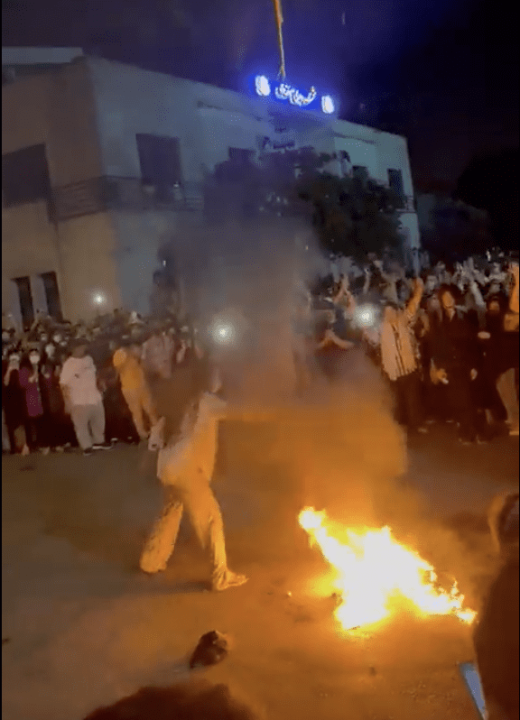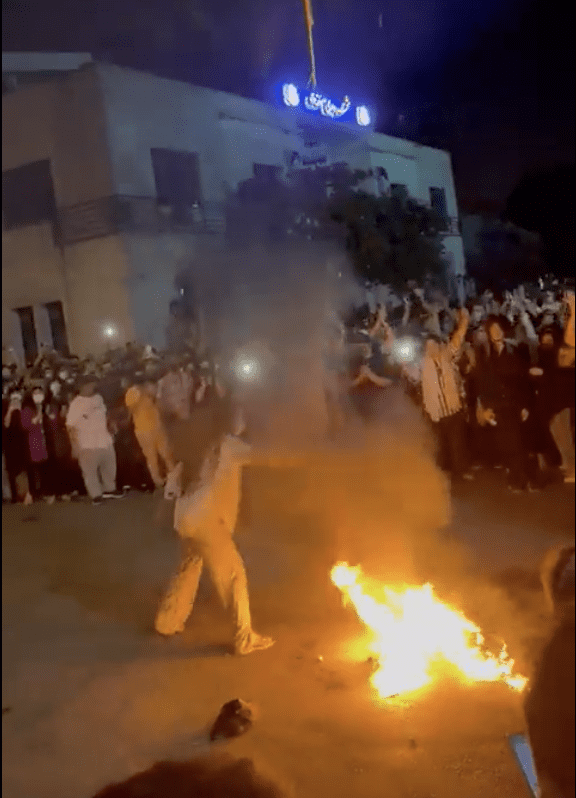The images coming out of Iran are remarkable. Women are ripping off their hijabs and burning them in public. They’re dancing in the streets and shaking their freed hair as onlookers whoop and cheer. These are stunning acts of defiance in a theocratic state in which women are expected to mildly, meekly accept their status as covered-up second-class citizens.
Of course these heart-stirring protests are a response to something unimaginably awful: the death of Mahsa Amini. Mahsa, a beautiful 22-year-old Kurdish woman from the city of Saqqez in Iranian Kurdistan, was arrested by the morality police in Tehran last week for failing to wear her hijab in the ‘appropriate’ way. She slipped into a coma while in police custody and died three days later.
The police say she died due to a heart condition. Her family insist she didn’t suffer from any such ailment. It is now being reported, including in the Guardian, that a CT scan of Mahsa’s head shows a fracture, haemorrhage and brain edema. If these reports are right, it will confirm furious Iranian youths’ suspicion that Mahsa died due to being roughed up by the morality cops.
Tell that to the women in Iran who detest this sartorial mark of their inferior social status
Anger has swept through Iran. And with good cause: it is an affront to every principle of liberty and equality that a woman can be questioned, never mind arrested and allegedly brutalised, over ‘unsuitable attire’. Young Iranians, both women and men, have had enough of being pushed around by the tyranny of theocracy. The solidarity between the sexes over the past three days and nights of protests has been inspiring.
In the northern city of Sari women danced and twirled and then ceremoniously threw their hijabs onto a bonfire. In Tehran a woman climbed onto a car and burnt her hijab on the end of a stick as crowds applauded. Protesters in Sanandaj, the capital of Iran’s Kurdistan region, chanted ‘Death to the dictator’ and ‘Death to Khamenei’ (the ayatollah). This is getting very serious indeed for the Iranian regime.
Expat Iranians have also cried ‘Death to Khamenei’ at protests around the world. There have been demonstrations against Iran’s misogynistic authoritarianism everywhere, from Toronto to Paris to Frankfurt. Many people are making it clear that they will not stand idly by when a woman is punished merely for failing to follow petty religious rules.
One concern I have, though, is that there might be a limit to the solidarity offered by Western activists to the revolters in Iran. For the sad truth is that some in the West now instinctively bristle at strong-worded criticism of Islam. Where Iranian protesters are bravely confronting the regressive, illiberal strain in political Islam, too many people over here shout ‘Islamophobia!’ at anyone who dares to utter a critical comment on that religion.
Consider the treatment of the Iranian emigre and feminist, Maryam Namazie. Ms Namazie is frequently denounced as a troublemaker, even an inciter of hatred, for her criticisms of Islam and theocracy. She has been no platformed by right-on student unions on the basis that her views are ‘inflammatory’.
One is forced to wonder if Britain’s student unions would likewise blacklist some of the brilliant, brave women currently taking to the streets of Iran. If any of them came to the UK and made stirring speeches about the wickedness of Sharia rule and the demeaning experience of life under an Islamist government – which is what Ms Namazie has done – would they also be demonised as ‘inflammatory’ and find themselves cast out?
Alongside Islamophobia, some people even talk about ‘hijabphobia’. A writer for the Huffington Post describes this as ‘hostility towards the hijab’. Well, a fair few women in Iran feel ‘hostility towards the hijab’. So much so that they are tearing it off their heads and throwing it into fire. Are they ‘hijabphobes’? Are they bigots? This is the perverse avenue that the West’s hyper-sensitivity on Islam threatens to take us down.
How is it possible for some leftists in the West to show meaningful solidarity with the liberty-loving women of Iran when they so often praise the hijab? The Guardian, for example, has published pieces arguing that the hijab has ‘nothing to do with oppression’ but rather is a garment that signifies ‘self-respect’. Tell that to the women in Iran who detest this sartorial mark of their inferior social status so much that they are setting it alight.
The protesters in Iran need our support and our solidarity. In order to give them that, we need to get over the idea that criticism of Islam is bigotry. Let us remember that both here and overseas, a woman’s right to live as she pleases must always take precedence over religious sensitivities. Every single time.








Comments